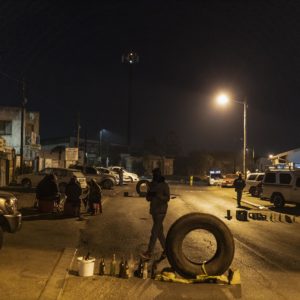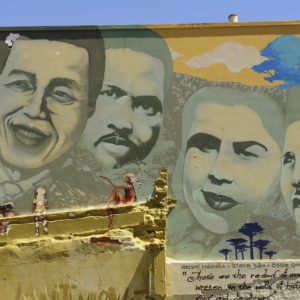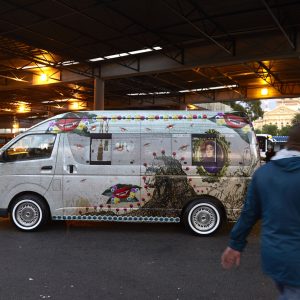Muslims ponder way forward after racism during riots
Durban’s Muslim community has been shaken by physical and verbal racist attacks in its midst that pitted Africans against Indians and went against many of the religion’s principles.
Author:
3 August 2021

Muslim activists and intellectuals are proposing a new antiracist structure to bring together different Black communities after racism erupted in KwaZulu-Natal during the recent riots. By the end of July, the total number of people killed in the riots in the province and Gauteng was estimated at close to 340. A police team is still investigating the deaths of 14 African people in the Durban township of Phoenix.
During the riots, racism also erupted in the Muslim community, with Maulana Muhammad Sandile Twala being physically attacked and verbally abused by his fellow Indian Muslims. Speaking in a voice note in isiZulu, Twala said “as soon as the riots began we sided with the fellow Muslims who happen to be Indian, making sure that masjids [mosques] are protected”.
He was then physically attacked by Indian Muslims, which he says shattered his spirit because he had to stay home and could not go out to help those in need. Later, when Twala went out to drop off food parcels, he says he “got stopped in a lot of places. Guns were pointed at me in the streets by some of our Indian brothers, brothers that I pray with in the same masjid.”
Twala says he was called the k-word and told Africans are “not supposed to travel in their [Indian] areas. I said to them, brother, I gave you salaam [I greeted you in the name of peace] and they said, ‘Fuck you and your salaam.’”
Twala says he was also told that Africans were ungrateful for food hampers they had been given in the past and that if he was seen again in Overport (officially an “Indian” area during apartheid but never fully segregated), he would be shot because he had been warned not to go there.
Related article:
Naadira Munshi, a Muslim feminist activist and trade unionist, points out that racism took on a very violent expression of macho vigilantism during the riots and “there was an almost disappearance of women and children in those spaces”.
“Indian-African racial tensions in South Africa are rooted in the colonial experience,” said Munshi. “Part of understanding this is understanding the colonial project of divide and rule and apartheid’s racial hierarchy, including geography and differential access to socioeconomic and political rights. So we have a democracy where apartheid’s social and economic system was never undone and where racism continues to be reinforced in the everyday structures and institutions that make up our society.”
Munshi says women must have a leading role in building a new solidarity among different races and groups in society. Overcoming apartheid and colonial divisions requires that “we also commit to true liberation where poverty is not normalised, where wealth is redistributed and where violence is addressed at root causes”, she said.
A missed opportunity
One of the ways in which this solidarity could be organised is through an antiracist structure led by working-class leaders, including religious figures, to discuss reparations for those affected. It should include communication structures that can rapidly mobilise in times of future crises, according to a proposal by Muslim community leader Na’eem Jeenah, a former anti-apartheid activist and currently the director of the Afro-Middle East Centre.
“Muslims, with their high ideals of justice and equality and fairness, and their communal relations extending between Indians and Africans, could have played a saner role that acknowledged the need for people to protect themselves, but that also ensured that ‘self-defence’ didn’t descend into racial attacks on innocent people. The community missed that opportunity,” he said.
Related article:
“Many African Muslims are now demanding that before any further discussion about relations within the Muslim community, there must be acceptance of responsibility for what happened not just to Twala, not just to African Muslims, but to innocent Africans who were targeted and attacked. It is an understandable and correct demand.”
The antiracist structure must include working-class leaders from all races and “should not be only for crisis response”, says Jeenah. “It needs to start working now on an ongoing basis to build relations, trust and cooperation among members of the communities more broadly.”
Jeenah says what happened should be acknowledged and those who carried out racist attacks must be brought to justice. “The long-term consequences [of denying it] in terms of a breakdown of trust, relations, of suspicion and resentment are enormous,” he added.
Breaking down barriers
Ibrahim Mphutlane wa Bofelo, a South African poet and Black Consciousness-inspired social critic, took part in setting up an antiracist forum for Muslims in Durban several years ago. But it fell apart, he says, when it reached a point where the participants suggested democratising Islamic institutions such as mosques, which have rules about only certain castes of Indian people being allowed on their boards.
“Until now, some mosques have a caste system that has been imported. Even the Juma mosque in Grey Street, Durban, still has that racist provision even though a significant number of worshippers are Black Africans and migrants from various parts of the world,” Wa Bofelo said.
Like Jeenah, Wa Bofelo believes the way forward after the racism displayed during the riots is to avoid denying it happened and for Indian Muslims to take the lead in helping to bring the perpetrators before the courts.
Related article:
“Then we can have an uninterrupted antiracist programme to find ways to roll back the apartheid geography through sports, arts and education that can make people learn how to live and work together. We need to do away with the racist language of Africans and Indians and unite around our common reality of blackness, building a lexicon that unites people without disregarding their origins,” Wa Bofelo said.
Durban academic Imraan Buccus says discussions to restart the antiracism forum in Durban are underway. “Any attempt at restarting a Muslim civil society initiative that looks at issues of racism and antiracism would be really, really useful. It would allow civil society to come together to cohere and to really mobilise rational voices against racism,” he said.
The city’s Muslim business leaders have also asked Buccus to put together a meeting with the shack dwellers’ movement Abahlali baseMjondolo “to talk about what happened in the city, to talk about the future, to talk about how Muslim businesspeople and social movements in Durban could interact, what projects people could collaborate on. That is another really useful initiative.”
Black with Black, not against
Muslim artist Thania Petersen says a Black front, to bring people together under one banner, is needed to avert future racist attacks and killings. “We are a fractured Black community and I include all shades of Black,” she said, adding that it is necessary to build Black solidarity.
“People of colour are suffering at the arse end of this country. Nobody is going to give housing, land, better healthcare back to us. There is a systematic war on all Black people. Because of the way colonialism and apartheid designed our communities, when we lash out, the closest person is always going to be another member of a Black community.
“When we feel angry, we are not going to travel all the way to the white areas with no petrol money to make trouble. We are just going to make trouble with the nearest person who seems to be living a better life. Without uniting, we sadly will not be able to break down this system.”
Related article:
Former trade unionist and Overport resident Woodrajh Aroun remembers a time when African and Indian workers in KwaZulu-Natal were united during apartheid. “It’s sad now to see historical working-class suburbs like Overport fractured by race,” said Aroun.
“The progressive trade union movement must bring workers into a cohesive force that goes beyond the boundaries of race and unites workers as workers. In the seventies in Durban, workers stood against the bosses and refused to be divided along racial lines. Building working-class solidarity is essential. If the unions fail to do so, our unity will remain illusory.”




